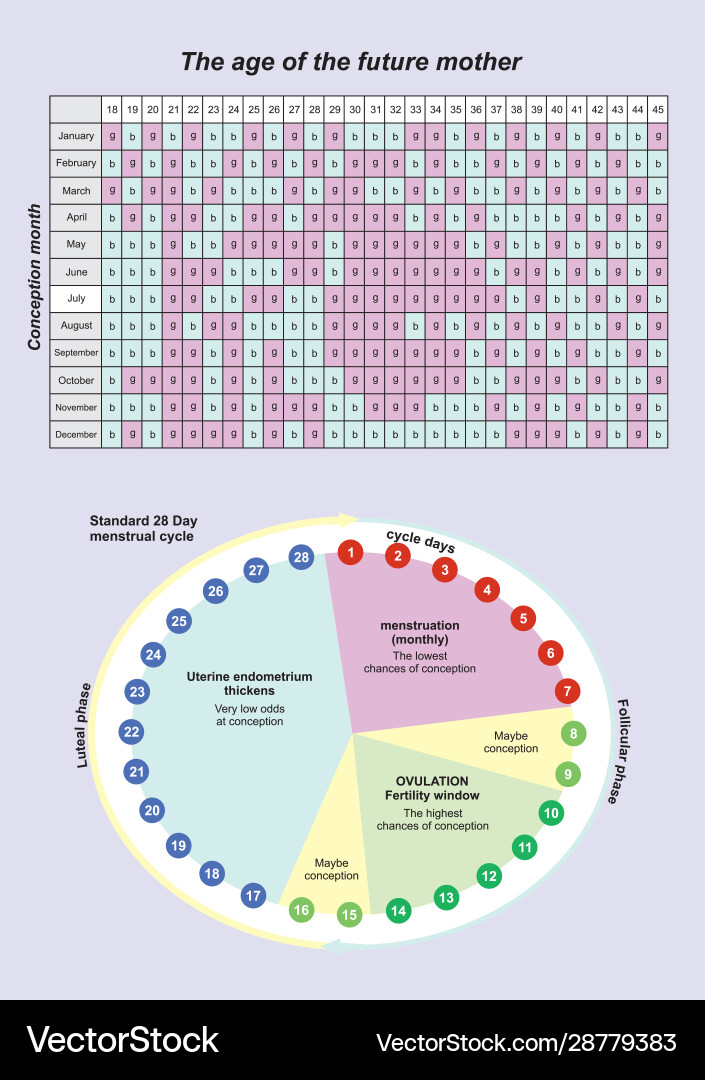
Pregnancy Conception Calendar: A Comprehensive Guide to Planning Your Pregnancy
Introduction
Conceiving a child is a joyous and life-changing event. For couples who are actively trying to conceive, understanding the process and timing of ovulation is crucial. A pregnancy conception calendar can be an invaluable tool in this journey, providing a visual representation of your fertile window and increasing your chances of getting pregnant.
Understanding Ovulation
Ovulation is the process by which a mature egg is released from one of the ovaries. This typically occurs 14 days before the start of your next menstrual period. However, the length of your menstrual cycle can vary, affecting the timing of ovulation.
The Fertile Window
The fertile window is the period of time during which you are most likely to conceive. It begins 5 days before ovulation and ends on the day of ovulation. During this window, the egg is viable and can be fertilized by sperm.
Using a Pregnancy Conception Calendar
A pregnancy conception calendar is a chart that tracks your menstrual cycle and predicts your fertile window. It can be used to:
- Identify your ovulation date: Mark the first day of your last menstrual period on the calendar. Count forward 14 days to estimate your ovulation date.
- Determine your fertile window: Shade in the 5 days before and the day of your predicted ovulation date. This represents your fertile window.
- Plan intercourse: Aim to have intercourse every other day during your fertile window to increase your chances of conception.
Types of Pregnancy Conception Calendars
There are various types of pregnancy conception calendars available:
- Printable calendars: These can be downloaded and printed for easy tracking.
- Online calculators: These websites and apps allow you to enter your menstrual cycle data and calculate your fertile window.
- Ovulation predictor kits (OPKs): These kits measure the levels of luteinizing hormone (LH) in your urine, which surges before ovulation.
Factors Affecting Ovulation
Several factors can affect the timing of ovulation, including:
- Stress: High levels of stress can delay or suppress ovulation.
- Weight: Being underweight or overweight can disrupt hormonal balance and affect ovulation.
- Medications: Certain medications, such as birth control pills and antidepressants, can interfere with ovulation.
- Medical conditions: Conditions like polycystic ovary syndrome (PCOS) and thyroid disorders can affect ovulation.
Tips for Optimizing Conception
In addition to using a pregnancy conception calendar, there are other steps you can take to optimize your chances of conception:
- Maintain a healthy weight: Aim for a body mass index (BMI) between 18.5 and 24.9.
- Manage stress: Engage in stress-reducing activities such as yoga, meditation, or spending time in nature.
- Get enough sleep: Aim for 7-9 hours of sleep each night.
- Eat a balanced diet: Consume plenty of fruits, vegetables, and whole grains.
- Limit caffeine and alcohol: Excessive consumption can interfere with ovulation.
- Quit smoking: Smoking damages the reproductive system and reduces fertility.
When to Seek Medical Advice
If you have been trying to conceive for over a year without success, it is advisable to seek medical advice. Your doctor can evaluate your fertility and recommend appropriate treatments if necessary.
Conclusion
A pregnancy conception calendar is a valuable tool for couples who are actively trying to conceive. By understanding your menstrual cycle and identifying your fertile window, you can increase your chances of getting pregnant. However, it is important to remember that conception is not always a straightforward process. If you are experiencing difficulties, do not hesitate to seek medical guidance. With patience, perseverance, and the right support, you can embark on the journey to parenthood with confidence.